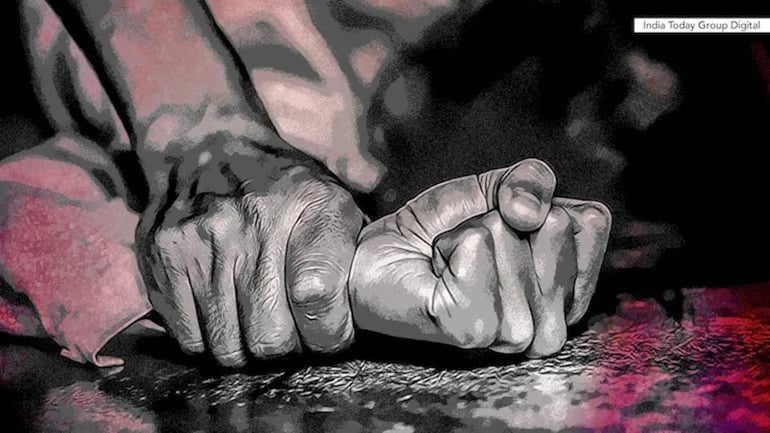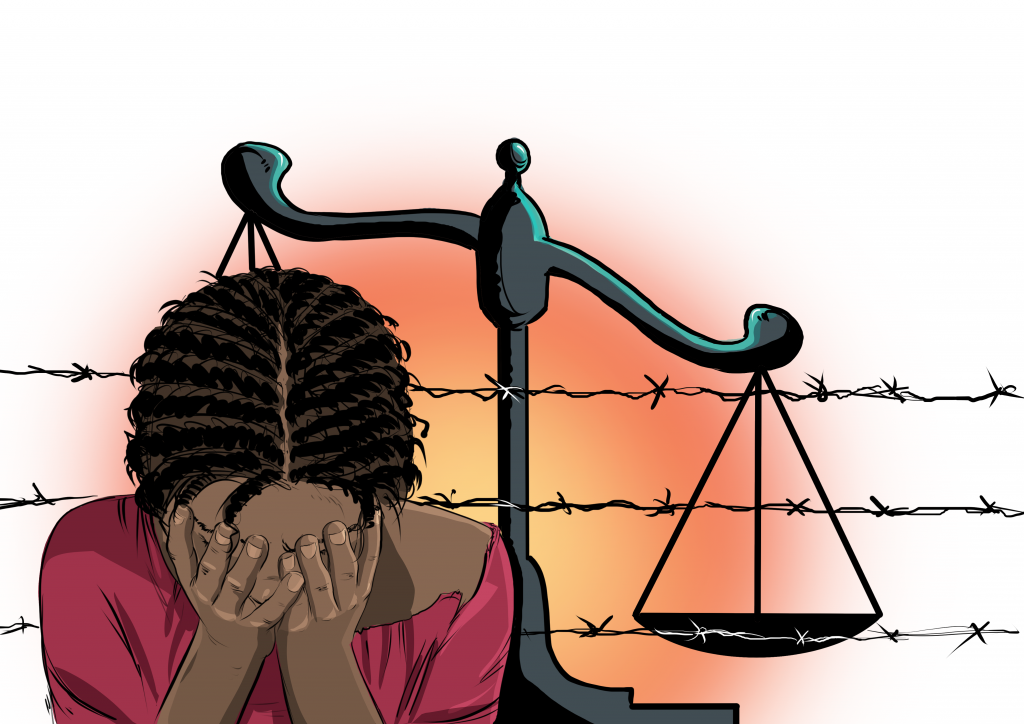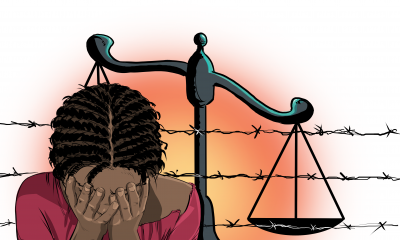Comments and Issues
Motherhood in childhood: Season of agony for toddlers in Nigeria?
Published
3 years agoon
By
Publisher
By Matthew Ma
“There are myriad consequences associated with rape and sexual abuse. Top on the list is the likely increase in HIV transmission. Sexual violence and HIV are two often interrelated global public health problems that spare no one, regardless of region, race, ethnicity, gender, class, sexual orientation, age, religion, ability, or disability.”
The rise in rape cases in Nigeria is scary, appalling, and ugly, especially the sexual abuse and exploitation of minors and underage girls. The issue is getting more and more worrying as perpetrators become megalomaniacs. It has left many wondering and asking what is amiss. Throughout history, we have distasteful stories of rape, be it to a particular group of people, society, religion, or culture.

In each of these rape cases, the victims were helpless, powerless, and stigmatized, with a scar of a lifetime left behind, one that may not heal anytime soon. There are instances of rape in the Bible with dire consequences following it, showing how it is not acceptable to God and the community. In all the rape cases, God was never silent about it. In Genesis 34, when Shechem raped Dinah, Dinah’s brothers take the assault as a matter of family revenge and use the opportunity to massacre the entire town.
In 1 Samuel, when one of David’s sons, Amnon, rapes his half-sister Tamar, a feud between brothers ensues, and Absalom murders his brother Amnon. While nobody comforts Dinah or Tamar, there is an acknowledgment that we should not tolerate rape behaviors in society.
In recent years, the rape of teenagers and toddlers has been on the surge, with 1 in every 4 Nigerian teenagers sexually assaulted before 18 years. The situation is even worse when we hear that teenagers have raped children in Internally Displaced Camps, an environment that shelters refugees. Recent headlines have seen a resurgence of reports of teenage rape at the hands of men either in offices (usually through sexual harassment and soliciting), in schools (with students and lecturers), among political office holders, the clergy, and hospitals (the list is endless).
For example, in June 2020, a 12-year-old girl in Ajah, Lagos, was raped by four masked men in her home. According to a family member who did not want his name published because of stigmatization, the pupil was not only raped but also brutalized. The family sources said she was home having an online class when the sad occurrence occurred.
According to reports, she was in the house with her father doing online lessons as required by COVID-19. But as the classes began, her father discovered an empty generator. So, the father went to the filling station to buy fuel. But immediately after he left, the rapists jumped into the fence to carry out the abuse. They covered their faces during this period so the victim would not identify them. News gathered during the ordeal that the 12-year-old victim had bruises on her private part, which led to massive bleeding.
In 2021, the Police Command in Yobe State said it arrested one Sani Sale, a vulcanizer, for allegedly raping and killing a 15-year-old girl in Gadaka town, Fika Local Government Area of Yobe. The Command’s Spokesman, ASP Dungus Abdulkarim, disclosed that the incident occurred when Sale, 38, lured the teenage bean cake seller into his house under the pretense of buying the cake.
Abdulkarim said Sale assaulted, abducted, and raped the victim, who was later found dead in the suspect’s home. Immediately after he committed the alleged crimes, Sale fled to Gombe to seek refuge. It was there the detectives trailed and arrested him. That same year, a 40-year-old man, Kullima Bulama, popularly known as Goske Mallam, was arrested after he allegedly raped a 10-year-old girl in Damaturu, the Yobe State capital. The suspect living in the same compound as the victim’s family, took advantage of the victim and sexually harassed her.
The mother of the victim noticed an abnormality with her. She instantaneously informed the father about it. During interrogations, the victim admitted that the suspect used to caress her private part. The mother and the NGOs that oversee gender violence later reported the matter to the police.
The same year, a state High Court sitting in Makurdi, Benue State, discharged and acquitted a lecturer at the Benue State Polytechnic, Ugbokolo, Andrew Ogbuja, of the charges of rape and causing the death of a 13-year-old schoolgirl, Ochanya Ogbanje. But in a separate case at the Federal High Court in Makurdi, the court convicted the lecturer’s wife, Felicia Ochiga-Ogbuja, for negligence in the rape of the deceased teenager. The lecturer and his son, Victor, both maternal relations of the victim, were accused of raping her until she fell ill and died.
Following the uproar that trailed the death, the Benue State Government instituted a case against the lecturer and his son. But delivering judgment at the state High Court, Justice Augustine Ityonyiman held that the prosecution failed to prove its four counts against Andrew. Justice Ityonyiman, while acquitting Andrew, alleged that the police investigator could not present the defendant to a medical exam to match his specimen with the findings in the medical reports presented before the court.
In evaluating the evidence, the judge held that two autopsy reports from the Federal Medical Center in Makurdi and the Nigeria Police Forensic Laboratory in Lagos left him in a dilemma. While the autopsy report from the Medical Center in Makurdi reports Ogbanje died of natural causes, the one from the police forensic laboratory said the deceased suffered diseases that were related to sexual abuse. Despite narrating her ordeals at the hands of the Ogbuja in a video — tendered before the court, Ityonyiman said it is regrettable that the deceased could not tell her story before she died. He, therefore, acquitted and discharged the defendant of all four counts of the charge.
A very worrying dimension of rape has increasingly gained prominence in the recent past in our environment. Recently, repeated reports of abuse of toddlers as young as three years appeared in the news in Nigeria. New pieces of evidence on sexual violence against minors have revealed that over 60 percent of rape victims in Nigeria were toddlers and teenagers.
There are reports that several persons have been arrested and convicted of raping toddlers across the country. In 2017, Nigerian police brought a 50-year-old man, Abdullahi Sani, to the Katsina High Magistrates Court for raping a 3-year-old toddler. Sani, the father of seven and a resident of Jabiri quarters, Funtua, was alleged to have committed the offense when he lured the little girl into an uncompleted building and had carnal knowledge of her.
According to the police report, Inspector Sani Addo revealed that Abdullahi Sani called the victim, took her to an unfinished building, covered her mouth, and raped her. In the process, she died instantly. The court further heard that Sani and the victim’s father, Ibrahim Abdullahi, resided in the same house at Jabiri quarters, Funtua.
A few Nigerians were alarmed in February last year with the news broke up that a Kano-based businessman, aided by his wife, raped a six-month-old baby girl named Khadija until she lost consciousness. Upon his arrest, the businessman hired ten lawyers to defend himself. At about the same time, a 27-year-old man was caught red-handed in Ogun State, raping his 11-month-old niece after using his fingers to open her up. The baby’s screams were said to have attracted some neighbors who rushed to the scene only to find the heartless man raping the toddler while she bled profusely.
Early in December last year, a three-year-old girl was raped in Masaka, a community on the outskirts of Abuja, by her unmarried 42-year-old relative. The toddler, who was playing at home with her siblings when the relative, known as Uncle Austin, carried out the heinous act, was eventually found crying in a pool of blood in a bush nearby. Even security operatives saddled with the responsibility of protecting citizens have escaped the menace. Sometime last year, there were reports of a two-year-old girl sexually molested by a policeman in the Federal Capital Territory (FCT).
Ironically, when the mother of the rape victim saw her bleeding and crying at the policeman’s house, the policeman’s wife quickly rose in her husband’s defense, insisting that the poor girl had started menstruating. The police authorities eventually transferred the suspect out of the FCT. And that seemed to be the end of the story as nothing more was heard about it.
Randomly picking up Nigerian national dallies and flipping through the pages opens one to the reality of this menace. Last week, Nigerian newspapers published a story on the tragic consequences of unplanned adolescent pregnancies by a 13-year-old girl in Anambra State. The news begins with a sober tale of a teenage mother (name withheld), impregnated by her guardian, whom she identified simply as Mr. Sunday. The news of her delivery broke out on social media over the weekend, which led the state ministry for women and children’s welfare to search for her.
The Commissioner for Women and Social Welfare in the state, Ify Obinabo, confirmed the development to journalists, adding that Mr. Sunday, who impregnated the teenager was arrested on December 11 by the team from the ministry and handed over to the police. In the viral video circulating online, the teenage girl holding the baby spoke to the investigator in the Igbo language. She narrated how her guardian serially raped her before getting her pregnant. The hospital management held her in the hospital over her inability to settle her medical bill after delivery. The teenager also told reporters that her guardian had been raping other children in the area. According to her, there is another girl who is seven years old that Mr. Sunday used to sleep with her.
Despite the widespread outcry over the rising cases of rape in Nigeria, there seems to be no end to the menace. There is no day in the country without a reported case of sexual violence in the media. The recent sexual violation and murder of a 22-year University of Benin undergraduate and the serial sexual abuse of a minor in Jigawa State by 14 men have ignited anger about the safety of women over rape cases and brutality. Since these crimes took place, there have been many other reported cases of violation of women and girls, and even more worrisome is the sexual violation of little girls in the country.
In 2019, while launching the Sex Offenders Register as a part of the government’s strategy to deal with rape in the country, Mrs. Pauline Tallen, Nigeria’s Minister for Women Affairs and Social Development, alleged that every year, about two million Nigerians (women and girls) are raped. A poll conducted by NOIPOLLS in 2019 revealed that most Nigerians (85%) believe there is a high prevalence of rape in Nigeria.
According to the report, about 3 in 10 Nigerians (26 percent) know someone raped in the past. The rape victims were minors and young adults aged between 1 – 15 years (72 percent) and 16 – 25 years (24 percent). This statistic infers that one in every three girls would have experienced at least one form of sexual abuse by the time they reach 25 years.
While we lament over women and girls whose violations occur in the purview of law and order, one wonders about the scope of rape and other forms of sexual abuse occurring in several conflict zones where women and girls are easily captured and turned into sex slaves. For example, the case of the adoption of young girls by insurgents is a typical example of such abuse.
There are myriad consequences associated with rape and sexual abuse. Top on the list is the likely increase in HIV transmission. Sexual violence and HIV are two often interrelated global public health problems that spare no one, regardless of region, race, ethnicity, gender, class, sexual orientation, age, religion, ability, or disability.
Sexual violence increases a victim’s risk of contracting sexually transmitted infections, including HIV. The short- and long-term effects of sexual violence and HIV can be both physically and psychologically debilitating for victims. The social stigma surrounding both issues can be severely isolating and burdensome, often preventing victims from disclosing and receiving support.
Often, the mindset of the rapist during the disgraceful act is to satisfy his sexual urge. Hence, in coercing the victim, there is no time to undergo a medical diagnosis to check HIV status. In the aftermath of a sexual assault or rape, survivors face trauma and painful emotions and experiences. The effects of the trauma can be short-term or last long after the sexual assault or rape. For example, the chance of stillbirths and death in the first week of life is 50 percent greater for a baby born to a teenager below twenty than those born to mothers between the ages of twenty to twenty-nine.
When a teenager is raped and becomes pregnant, her present and future change radically, or rarely for the better. Her education may end, her job prospects evaporate, and her vulnerabilities to poverty, exclusion, and stigmatization multiply. The adolescent girl’s newborn is at increased risk for low-birth weight and sexually transmitted infections, including HIV.
The question now is, what is the way forward? How do we create a safe environment for women and children in Nigeria? Every second, every minute, every hour, every day, women and girls face disproportionate sexual and gender-based violence in the forms of rape, defilement, trafficking, sexual harassment, wife battery, domestic abuse, early and forced marriage, including denial of inheritance rights, torture, acid attack, neglect without her livelihood, denial of custody rights, etc.
To tackle this disheartening act, let us apply some key means of socialization. Starting from the family, parents need to educate and enlighten their wards on rape, its atrocities, and its implications. In Nigeria, parents often talk to girls about rape prevention but never give the same adequate knowledge to the boys. Research confirms that parents more frequently frame conversations around reducing the risk of assault with daughters than boys. Education alone is by no means a panacea, but it is undoubtedly a solid start. Education, like all good prevention, should start early and occur often. It should go beyond what girls can do to prevent being victims to the attitudes boys have about women and masculinity and the actions men can use to promote mutual respect and egalitarianism.
Children (both male and female) should have adequate knowledge of sex education. Schools, as the secondary agents of change, should provide our children with holistic sex education programs. A holistic sex education class will help normalize many of our seemingly omnipotent sexual beings. Sex education in the curriculum will enable us to appreciate women not as social tools to use and throw away but as human beings created in God’s image and likeness.
It will provide a pathway for students to develop a broad knowledge and understanding of human sexuality and the dangers that arise when we misuse it. Religion is a personal and institutional reality in the lives of Nigerians. So, it is no surprise that religious teaching and affiliation provide a significant context for many women as they address victimization. Through narratives, traditions, beliefs, and doctrines, religious communities and institutions convey values and belief systems to their members.
In addition, members should often have direct support or counseling relationships with religious leaders who may provide guidance or instruction. Religious texts and teachings can serve as resources to assist those who have experienced abuse in finding safety and healing. To adequately respond to the needs of battered women and rape victims, clergy must learn about violence against women and reach out to secular advocates and services. Likewise, nonreligious advocates and counselors must appreciate the importance of women’s religious backgrounds and reach out to clergy and religious groups to find resources to meet the needs of victims. Religious leaders can also use their status as community leaders to help shape discussions on violence against women.
With the recent rise in rape cases and other forms of sexual abuse, the nation needs to rise to the occasion and deal with it. The Sex offender Registers, even though commendable, are technically deficient without a national database containing information on every citizen and a criminal record system.
Secondly, the handling of reported cases by the police force at times has discouraged many victims of rape from coming forward to report the crime. There is a need to speed up rape cases in court to restore confidence in the mind of victims. If rapists should be tried and jailed in time, it can serve as a form of deterrence to future offenders. There are perceptions that rape cases have been under-reported, especially by the police. There are fears that even if the victims report the culprit to law enforcement agencies, there are no actions against them as the culprits always walk away with their shoulders up high. Hence, revealing a rape case is somehow a waste of time for victims.
The fear of not being believed or being blamed for being raped creates a dangerous culture of silence that prevents survivors from seeking justice. It is unacceptable that the survivors of rape and other forms of gender-based violence face such a torturous ordeal to get justice, which only adds to their pain. Likewise, even the ‘state of emergency has proven to be an empty declaration, which has done nothing to protect girls. There is a need for policy actions and legislation to curb the menace of rape in Nigeria and also ensure that victims get the justice they deserve.
Government must as a matter of urgency devise programs and policies to retain pregnant girls back to school after birth, promote sex education aimed at abstaining from sex, and create a dialogue with parents to discourage them from sending their children to become house girls. The government should sensitize the community against risky behaviors and early sex, strengthen the implementation of existing laws to deter sexual abusers, and promote the sexual and reproductive rights of teenage girls so that they have control in making decisions when they are abused.
Similarly, relevant authorities must act to protect women and girls from rampant sexual violence. All reported cases of rape must be thoroughly, promptly, and impartially investigated, perpetrators prosecuted, and convicted, sentenced with appropriate penalties. The system must create a concrete implementation and enforcement framework to revoke existing discriminatory laws. Nigerian police must provide all necessary support to survivors and act in line with their code of conduct by providing a safe process of seeking justice for survivors to report rape and other gender-based violence and get justice.
In addition, the courts must ensure that they prosecute cases of sexual violence fairly and promptly. We must address any backlog in rape cases that may create unacceptable barriers to rape survivors’ access to justice.
- Rev. Ma, S.J, is a Jesuit Catholic priest and doctoral student in public and social policy at St. Louis University in the state of Missouri, USA.
Trending

 Latest5 days ago
Latest5 days agoYoruba film industry mourns as popular actress aunty Ajara passes away

 Trends6 days ago
Trends6 days agoTonto Dikeh reunites son with Churchill after decade-long split

 Football1 week ago
Football1 week agoArsenal’s Osman Kamara completes permanent move to Blackburn Rovers

 Football1 week ago
Football1 week agoEPL: Confirmed transfer deadline day deals in January 2026

 Health1 week ago
Health1 week agoControversial preprint revives vaccine–autism debate, draws sharp pushback from medical experts

 Business1 week ago
Business1 week agoCBN releases fintech report, maps growth, opportunities, risks in Nigeria’s digital finance sector

 Football1 week ago
Football1 week agoRonaldo’s future at Al Nassr in doubt as €50m release clause emerges

 Latest1 week ago
Latest1 week agoEx-Buhari Chief of Staff Gambari breaks silence on “Cabal,” body double rumours



